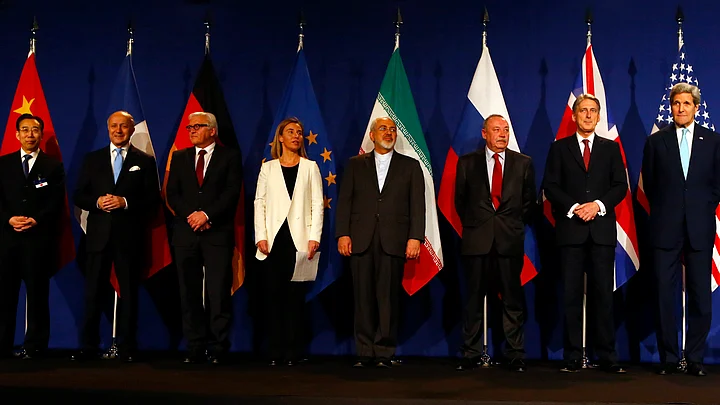After marathon negotiations, the United States, Iran and five other world powers announced a deal on Thursday outlining limits on Iran’s nuclear program so it cannot lead to atomic weapons, directing negotiators toward a comprehensive agreement within three months.
Reading out a joint statement, European Union foreign policy chief Federica Mogherini hailed what she called a “decisive step” after more than a decade of work. Iranian Foreign Minister Mohammad Javad Zarif followed with the same statement in Farsi. U.S. Secretary of State John Kerry and the top diplomats of Britain, France and Germany also briefly took the stage behind them.
In Lausanne, Kerry said in a tweet that there was agreement “to resolve major issues on nuclear program. Back to work soon on a final deal.”
Mogherini said the seven nations would now start writing the text of a final accord. She cited several agreed-upon restrictions on Iran’s enrichment of material that can be used either for energy production or in nuclear warheads.
Crucially for the Iranians, economic sanctions related to its nuclear programs are to be rolled back after the U.N. nuclear agency confirms compliance.
Zarif told reporters the agreement would show “our program is exclusively peaceful, has always been and always will remain exclusively peaceful,” while not hindering the country’s pursuit of atomic energy for civilian purposes.
“Our facilities will continue,” he said. “We will continue enriching, we will continue research and development.” He said a planned heavy water reactor will be “modernized” and that the Iranians would keep their deeply buried underground facility at Fordo.
“We have taken a major step but are still some way away from where we want to be,” Zarif said, calling Thursday’s preliminary step as a “win-win outcome.”
Israeli leaders, deeply concerned about Iran’s intentions, were much less positive.
A final agreement must significantly roll back Iran’s nuclear capabilities and stop its terrorism and aggression.
– Israel Prime Minister Benjamin Netanyahu
The U.S. and its five partners want to curb Iran’s nuclear technologies so it cannot develop weapons. Tehran denies such ambitions but is negotiating because it wants economic sanctions imposed over its nuclear program to be lifted.
The U.S. and other Western Powers involved in the agreement, however, have hailed the breakthrough as a positive step.
If a final agreement is achieved, it could in my view not only pave the way for a solution to the Iran conflict, but it would be the first and only conflict in the Middle East where we will have achieved a deescalation. It could therefore provide hope for an easing of tensions in the region and between Iran and Arab states.
– Frank-Walter Steinmeier, German Foreign Minister
Today, the U.S, together with our allies and partners, has reached a historic understanding with Iran, which if fully implemented, will prevent it from obtaining a nuclear weapon. If this framework leads to a final comprehensive deal, it will make our country, our allies and our world safer.
– Barack Obama, U.S. President
Explaining what the implication of a final deal would be, Barack Obama said that international inspectors would have unprecedented access not only to Iranian nuclear facilities, but to the entire supply chain that supports Iran’s nuclear program.
“If Iran cheats, the world will know it. If we see something suspicious, we will inspect it”, he said.
The final breakthrough came after a day after a flurry of overnight sessions between Kerry and Zarif, and meetings involving the six powers.
(With Agency Inputs)
(At The Quint, we question everything. Play an active role in shaping our journalism by becoming a member today.)
